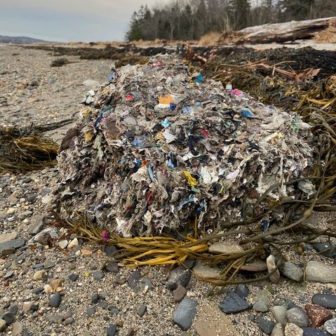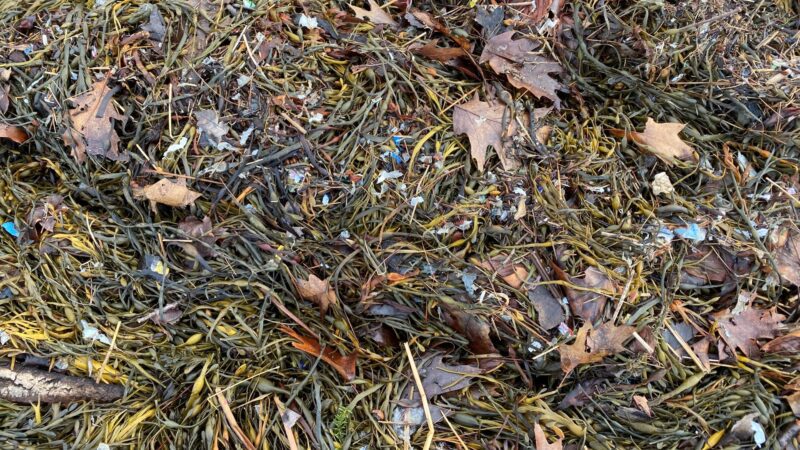The Maine Department of Environmental Protection has proposed fining Sprague Operating Resources $17,800 for violating the state’s pollution control law after a December 2020 incident.
Two shredded plastic bales fell into the ocean at Sprague Terminal in Searsport while workers were offloading them. The company did not report the dropped bales to the DEP until a week later, after agency staff received a complaint about plastic washing onto the shores of nearby Sears Island.
In an unsigned administrative consent agreement released in mid-September, the DEP proposed the fine and said Sprague had revised its operations manual as well as conducted training with management at the Searsport terminal in July. The agreement was released for public comment but will not be finalized until it is approved by the DEP board and the Maine Attorney General.
Last Dec. 2, Sprague workers were using a crane to offload bales of solid recovered fuel (SRF) from the vessel MV Sider London to the pier at Mack Point. Composed primarily of shredded plastic and paper, the bales, wrapped in a thin plastic film, were destined for the Penobscot Energy Recovery Company’s (PERC) waste-to-energy plant to be burned for fuel.
During the transfer, according to state records, the lifting straps on two bales slipped and the bales, which weighed roughly 2,500 pounds combined, fell. One hit the pier, broke open and fell into the water, where it sank immediately; another hit the water and sank slowly, according to DEP records.
On Dec. 8, DEP staff received a complaint that there was plastic in the water near Sears Island, and plastic shreds had washed up on the causeway and western shore.
“Suspecting that the material had come from the terminal, the Department advised Sprague to inspect the shorelines and clean up any material. Sprague did not report the lost cargo to the department during that communication,” wrote DEP staff in the agreement. The company did not report the lost bales until the following day, when agency staff visited the site.
The intact bale was recovered by divers hired by Sprague several weeks later. Volunteers from the conservation group Friends of Sears Island, which stewards part of the island, spent weeks alongside a professional remediation team hired by Sprague, attempting to pick bits of plastic from the other bale from the sand and seaweed.
Plastic among the seaweed
“It was difficult work under any circumstances,” said Rolf Olsen, vice president of the board for Friends of Sears Island. “After the big clumps are gone, then it’s just colorful specks in and among the seaweed on the shore.”

Olsen expressed frustration that a resolution took so long. “We spent, I couldn’t tell you how many dozens and dozens of hours between December and January monitoring things to make sure things were remediated effectively,” said Olsen. The organization is almost entirely volunteer-run, he said, with one paid staff person for outreach.
“The fine — we don’t see any of it. We spent an awful lot of time trying to manage the situation,” said Olsen, adding that he didn’t have a sense of whether the $17,800 fine was “the appropriate scale for such an incident.”
Department staff consider a range of factors when determining a monetary penalty, including damage done to the environment, the potential for remediation, possible effects on human health, whether there has been restoration, how the violation was discovered and the potential for recurring violations.
The spill also raised questions about why shredded plastic was being imported in the first place. The shipment, which came from Northern Ireland, was destined for the PERC plant in Orrington.
“We were looking for a stable, storable fuel and this material fit that bill,” PERC plant manager Henry Lang told The Ellsworth American this spring, saying “It was an insurance policy.”
With landfills close to capacity, Northern Ireland exported nearly a quarter-of-a-million metric tons of waste last year for landfilling or incineration, according to the Belfast Telegraph.
Sprague representative Shana Hoch said in an email that the company was not aware of plans for future shipments of SRF.

She added: “Should further shipments be made, air bag bladders will be required between the stacks to prevent damage during transit, bales will be loaded onto and lifted off of the vessel on trays designed to prevent separation, and metal deflectors will be placed between the vessel and the dock to prevent material from entering the water.”
Olsen said he still finds occasional shreds of plastic on the shore.
“It’s not something that a casual visitor will see and observe and identify, but it was pretty distinctive little shreds of blue and red and green and white plastic.
“It’s safe to say, too, there’s a fair amount of plastic from other sources in our environment on the shores of Sears Island,” he said. “(But) there’s still evidence of this particular spill.”
Disclosure: Maine Coast Heritage Trust holds an easement on a section of Sears Island. Kate Cough’s husband, Caleb Jackson, works for Maine Coast Heritage Trust.
Editor’s Note: This story was corrected Oct. 13 to denote the shipment originated from Northern Ireland, not Ireland. As such, the fact and statistic about Ireland’s landfills was amended to reflect the status of Northern Ireland’s landfills.




